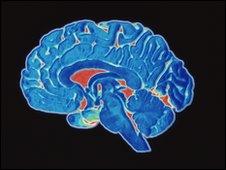Huntington's 'far more prevalent'
- Published

Anyone who carries the gene will develop the condition
A devastating brain condition is at least twice as common as was previously thought, medical experts say.
Huntington's Disease (HD), which is genetically inherited, currently affects at least 6,700 people in England and Wales.
Researchers writing in the Lancet say stigma means families disguise the condition, or deaths are misrecorded.
Anyone who carries the mutant gene will go on to develop HD, and their child has a 50% chance of inheriting it.
The experts said it was "shameful" that patients who know they carry the gene have to declare this to insurance companies.
HD affects muscle co-ordination, often causing involuntary writhing movements called chorea, and it leads to cognitive decline.
There is no cure, although experts in a British Medical Journal article point out that various treatments can help improve the symptoms.
Death may not occur until 15-20 years after onset. Sufferers typically start to notice the illness in their late 30s or early 40s.
Previous studies based on 15 locations in the UK suggested the HD prevalence was 6.7 cases per 100,000 population.
Professor Sir Michael Rawlins writes in the Lancet today that there needs to be greater understanding and awareness of HD. MPs and peers are launching an All Party Parliamentary Group devoted to HD.
He is the chairman of the National Institute of Health and Clinical Excellence (NICE) but has taken up the cause of HD in his capacity as an honorary professor with the London School of Hygiene and Tropical Medicine.
'No doubt'
Prof Rawlins said: "The Huntington's Disease Association currently cares for 6,702 people in England and Wales with symptoms.
"Specialist neurologists have referred all of them, so their diagnoses can hardly be in doubt.
"From these numbers alone, the minimum prevalence in England and Wales must therefore be at least 12.4 per 100,000."
A genetic test for HD was identified in the early 1990s - but many people with a family history prefer not to know if they are carriers.
Professor Rawlins added: "Huntington's Disease is the only genetic condition for which the insurance industry loads those at risk.
"The stigma - to the insurance industry's eternal shame - is not only societal but also actuarial."
Companies have been authorised by the government's Genetics and Insurance Committee to require people who have tested positive for the HD gene to declare their status when applying for life insurance policies over ВЈ500,000.
In a separate Lancet article, historian Alice Wexler, whose sister Nancy led work to discover the HD gene, writes about the condition's stigma. Her mother and grandfather died from the disease.
She said: "Various narratives bolstered stereotypes of individuals with disabilities as aggressive, violent, criminal and dangerous, while adding to the stigmas associated with mental illness and cognitive impairment.
"They gave a rationale for doctors to endorse sterilisation or even celibacy for people at risk of Huntington's."
Dr Wexler has declined the test to predict whether she would develop HD.
She said: "I was already 40 when it became available. I seriously considered it, but living with the uncertainty was acceptable for me. It's a very individual decision."
An spokesperson for the Association of British Insurers said:
"The agreement between the Government and the insurance industry means that people with a family history of Huntington's Disease taking out up to ВЈ500,000 worth of life insurance do not have to tell the insurance company whether or not they have had a predictive genetic test - even if they have, and the test result was unfavourable.
"If the test result was favourable and the person chooses to disclose it, most insurance companies will take it into account to override the effect of the person's family history."